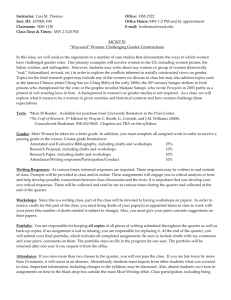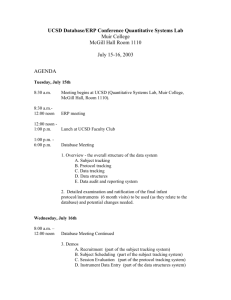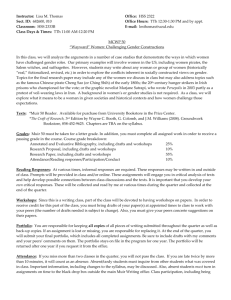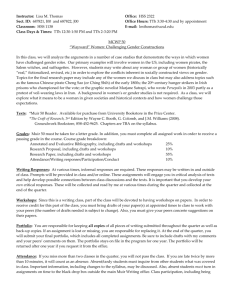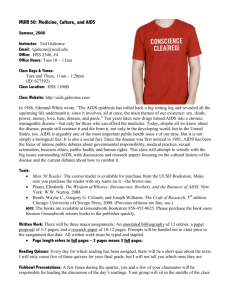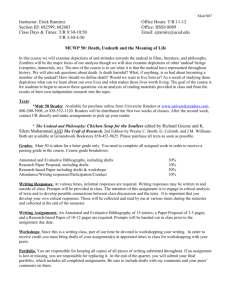Summer 2010 Syllabus
advertisement
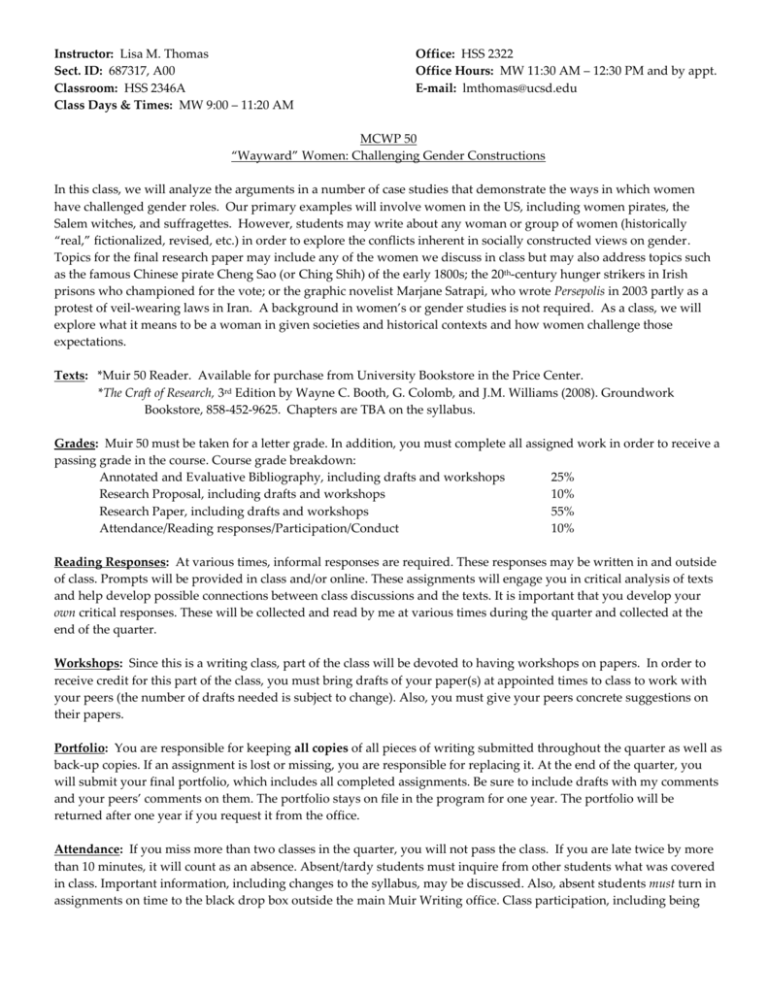
Instructor: Lisa M. Thomas Sect. ID: 687317, A00 Classroom: HSS 2346A Class Days & Times: MW 9:00 – 11:20 AM Office: HSS 2322 Office Hours: MW 11:30 AM – 12:30 PM and by appt. E-mail: lmthomas@ucsd.edu MCWP 50 “Wayward” Women: Challenging Gender Constructions In this class, we will analyze the arguments in a number of case studies that demonstrate the ways in which women have challenged gender roles. Our primary examples will involve women in the US, including women pirates, the Salem witches, and suffragettes. However, students may write about any woman or group of women (historically “real,” fictionalized, revised, etc.) in order to explore the conflicts inherent in socially constructed views on gender. Topics for the final research paper may include any of the women we discuss in class but may also address topics such as the famous Chinese pirate Cheng Sao (or Ching Shih) of the early 1800s; the 20th-century hunger strikers in Irish prisons who championed for the vote; or the graphic novelist Marjane Satrapi, who wrote Persepolis in 2003 partly as a protest of veil-wearing laws in Iran. A background in women’s or gender studies is not required. As a class, we will explore what it means to be a woman in given societies and historical contexts and how women challenge those expectations. Texts: *Muir 50 Reader. Available for purchase from University Bookstore in the Price Center. *The Craft of Research, 3rd Edition by Wayne C. Booth, G. Colomb, and J.M. Williams (2008). Groundwork Bookstore, 858-452-9625. Chapters are TBA on the syllabus. Grades: Muir 50 must be taken for a letter grade. In addition, you must complete all assigned work in order to receive a passing grade in the course. Course grade breakdown: Annotated and Evaluative Bibliography, including drafts and workshops 25% Research Proposal, including drafts and workshops 10% Research Paper, including drafts and workshops 55% Attendance/Reading responses/Participation/Conduct 10% Reading Responses: At various times, informal responses are required. These responses may be written in and outside of class. Prompts will be provided in class and/or online. These assignments will engage you in critical analysis of texts and help develop possible connections between class discussions and the texts. It is important that you develop your own critical responses. These will be collected and read by me at various times during the quarter and collected at the end of the quarter. Workshops: Since this is a writing class, part of the class will be devoted to having workshops on papers. In order to receive credit for this part of the class, you must bring drafts of your paper(s) at appointed times to class to work with your peers (the number of drafts needed is subject to change). Also, you must give your peers concrete suggestions on their papers. Portfolio: You are responsible for keeping all copies of all pieces of writing submitted throughout the quarter as well as back-up copies. If an assignment is lost or missing, you are responsible for replacing it. At the end of the quarter, you will submit your final portfolio, which includes all completed assignments. Be sure to include drafts with my comments and your peers’ comments on them. The portfolio stays on file in the program for one year. The portfolio will be returned after one year if you request it from the office. Attendance: If you miss more than two classes in the quarter, you will not pass the class. If you are late twice by more than 10 minutes, it will count as an absence. Absent/tardy students must inquire from other students what was covered in class. Important information, including changes to the syllabus, may be discussed. Also, absent students must turn in assignments on time to the black drop box outside the main Muir Writing office. Class participation, including being prepared to discuss the assigned texts, is crucial to this course. If you do not participate in class, you will be counted as absent. Missing a scheduled conference also counts as one absence. Conduct: Always bring your Reader or assigned text to class. Assigned readings should be completed before class. Please come prepared to discuss the material in a thoughtful manner. Be respectful to classmates and the instructor. Any comments or actions that instigate or contribute to a disrespectful or hostile environment in the classroom will not be tolerated. Any individuals who, as a result of their words or behavior, silence their classmates will be held accountable. Turn off all electronic devices such as cell phones, iPods, etc. Do not check your email, text-message, or engage in other distracting activities while in class. Late Papers/Paper Submission: Late papers are not accepted unless special arrangements are made with me ahead of the due date—NO EXCEPTIONS! You will be asked to use a specific documentation and format style according to the assignment. This will be made clear with each assignment. Papers must be typed on 8x11” paper and be double-spaced, with your name, paper identification, and page number on each page in a header (you do not need to mark page 1). The only acceptable way to submit a paper to me other than in person is to place it in the black drop box outside the Muir Writing Program office. Do not slide papers under the program door or leave them in my personal mailbox. Turnitin.com: The same final papers you turn in to me must be uploaded to www.turnitin.com. Students agree that by taking this course all required papers will be subject to submission for textual similarity review to Turnitin.com for the detection of plagiarism. All submitted papers will be included as source documents in the Turnitin.com reference database solely for the purpose of detecting plagiarism of such papers. Failure to submit your papers to Turnitin.com will result in an F for the course. Email Account: Please sign up for a free UCSD email account for class as soon as possible. The Academic Computing office is located in APM 2113; its website is http://acs.ucsd.edu. Check your inbox daily for course announcements. If contacting me by email, please use appropriate email etiquette. I will only respond to emails sent from your UCSD email account. Academic Honesty: Plagiarism is strictly prohibited. In general, plagiarism is defined as failing to cite quotations and borrowed ideas, failing to enclose borrowed language in quotation marks, and failing to put summaries and paraphrases in your own words (A Writer’s Reference 1999). In addition to paper materials (books, articles, etc.), plagiarism also refers to quotations and ideas from web sources. See “Avoiding Plagiarism” in the Reader Appendix for a more thorough discussion. When in doubt, ask me for clarification. Academic Integrity: Students are expected to do their own work as outlined in the UCSD Policy on Academic Integrity published in the UCSD general catalog (http://www.ucsd.edu/catalog/AcadRegu.html, click on “Academic Regulations”). Therefore, students must do their own work, including the translation of work written in a language other than English. Also, it is against the policy to “recycle” a paper written for one course and turn it in for credit in another course, including a Muir Writing course. In other words, if you took a Muir Writing course before, you may not turn in a paper you wrote for that earlier course! Acts of academic misconduct will not be tolerated. Any student who engages in suspicious conduct will be confronted and subject to the disciplinary process. Online Course Evaluations: Each Muir Writing Program student is asked to complete an online Course Evaluation. A link to the evaluation, along with instructions for accessing and completing the evaluation, will be emailed to your UCSD email account during the second half of the quarter. Print out the Confirmation Page—the final page of the online evaluation—and submit it as part of your final portfolio. Useful Websites: Course Website: http://lmthomasmuir.wordpress.com (for online readings, reading responses, and handouts) Muir College Writing Program: http://www-muir.ucsd.edu/muir-writing MLA documentation style: http://www.dianahacker.com/resdoc/home.html Non-sexist language: http://owl.english.purdue.edu/handouts/general/gl_nonsex.html Week 1: Introduction to Gender Constructions MON. 6/28 Introduction to the course; in-class writing; discuss topics; discuss annotated bibliography HOMEWORK FOR NEXT TIME: explore course website + Reading (see 6/30) WED. 6/30 Discuss paper topics and readings; discuss annotated bibliography assignment and research process READING DUE: Muir program policies/integrity/plagiarism from Reader Appendix (A1-A7) de Beauvoir, Simone. “Introduction” to The Second Sex. 11-18. (Online) Butler, Judith. “Imitation and Gender Insubordination.” 1990. 127-32. (*Read PDF version OR—on web version—start on page 127 within the chapter, where there’s a section break near the top of the page) (Online) Alcoff, Linda. “Cultural Feminism versus Post-Structuralism: The Identity Crisis in Feminist Theory.” 330-341, 347-355. (Online) Cahill, Ann J. “Judith Butler. Introduction: The Politics of Sexual Identity.” 2003. 23-28. HOMEWORK FOR NEXT TIME: Reading; begin research for bibliography Week 2: Piracy and Cross-Dressing / Witchcraft MON. 7/5 NO CLASS—HOLIDAY HOMEWORK FOR NEXT TIME: Write Draft 1 of Annotated Bib. (3 entries); bring 1 copy to class + Reading WED. 7/7 Draft 1 of Annotated Bib. due, 1 copy (3 entries) for workshop; introduce paper proposal READING DUE: Johnson, Charles. A General History of the Robberies and Murders of the Most Notorious Pirates. 1724. (Online) “The Life of Mary Read.” Pp. 117-24. “The Life of Anne Bonny.” Pp. 125-31. Rediker, Marcus. “The Women Pirates: Anne Bonny and Mary Read.” Villains of All Nations. 2004. 103-26. (Reader) Reis, Elizabeth. Damned Women. 1999. Preface xi-xviii (section break) AND Introduction 1-11. (Online) “Susanna Martin, on Trial for Witchcraft.” 1692. In Root of Bitterness 32-35. (Online) HOMEWORK FOR NEXT TIME: Write Draft 2 of Annotated Bib. (6 entries); bring 1 copy to class + Write Draft 1 of Paper Proposal (2 pp.); bring 1 copy to class + Reading Week 3: Women and Race MON. 7/12 Draft 2 of Annotated Bib. due, 1 copy (6 entries); Draft 1 of Paper Proposal due, 1 copy (2 pp.); discuss readings and conferences READING DUE: hooks, bell. “Homeplace (a site of resistance).” 1990. 382-90. (Online) Truth, Sojourner. “Ain’t I a Woman?” 1851. 6 paragraphs. (Online) Ritchie, Joy S., and Kate Ronald. Available Means: An Anthology of Women’s Rhetoric(s). (Online) Harper, Frances Ellen Watkins. “We Are All Bound up Together.” 1866. 147-50. (Online) Minh-ha, Trinh T. From Woman, Native, Other. 1989. 378-81. (Online) Silko, Leslie Marmon. “Yellow Woman and a Beauty of the Spirit.” 1994. 10-15. (Online) Anzaldúa, Gloria. From Borderlands/La Frontera: The New Mestiza. 1987. 3015-25, 3033-35. (Online) HOMEWORK FOR NEXT TIME: attend conference with completed conference worksheet WED. 7/14 NO CLASS—CONFERENCE My conference is: Day ______ ______ _______ Time______________ in HSS 2322. Each student will meet with me individually for 30 minutes. We will discuss your portfolio and paper progress. Bring questions, pen, and paper. A missed conference is considered an absence. HOMEWORK FOR NEXT TIME: Finalize Annotated Bib. (10 entries) and Paper Proposal (3-5 pp.); post both to Turnitin.com and bring 1 copy of each to class; + Reading Week 4: Women and Violence MON. 7/19 Final Annotated Bib. due (10 entries) and Paper Proposal due (3-5 pp.); introduce final paper READING DUE: Mather, Cotton. “A Narrative of Hannah Dustan’s Notable Deliverance from Captivity.” 1697. 161-64. (Online) Filetti, Jean S. “From Lizzie Borden to Lorena Bobbitt: Violent Women and Gendered Justice.” Journal of American Studies 35.3 (2001): 471-84. (Online) Scheeres, Julia. “Dorothea Puente.” TruTV. Pages (“Chapters”) 1-4, 6, 8, 14, 17. (Online) HOMEWORK FOR NEXT TIME: Write Draft 1 of Research Paper (3 pp.); bring 1 copy to class + Reading WED. 7/21 Draft 1 of Research Paper due, 1 copy (3 pp.); workshop READING DUE: Gustafson, Sandra M. Excerpt from Ch. 7. “Figures of Difference.” Eloquence is Power. 2000. 246-57. (Reader) Sampson, Deborah. “An Address on Life as a Female Revolutionary Soldier.” 1802. 135-41. (Online) Howard, John W., and Laura C. Prividera. “The Fallen Woman Archetype: Media Representations of Lynndie England, Gender, and the Uses of U.S. Female Soldiers.” Women’s Studies in Communication 31.3 (2008): 287-311. (Online) HOMEWORK: Write Draft 2 of Research Paper (5-7 pp.); bring 1 copy to class + Reading Week 5: Labor and (In)Dependence MON. 7/26 Draft 2 of Research Paper due, 1 copy (5-7 pp.); discuss readings READING DUE: Stansell, Christine. “Chapter 5: Women and Men.” 1987. 76-101. (Reader) Gilman, Charlotte Perkins. “The Yellow Wall-Paper.” 1899. 15 pp. (Online) Castiglia, Christopher. “Three: That Was Not My Idea of Independence: The Captivity of Patty Hearst.” Bound and Determined. 1996. 87-105. (Online) Martin, Emily. “The Egg and the Sperm: How Science Has Constructed a Romance Based on Stereotypical Male-Female Roles.” 1991. 485-501. (Online) HOMEWORK FOR NEXT TIME: attend conference with completed conference worksheet WED. 7/28 NO CLASS—CONFERENCE My conference is: Day ______ ______ _______ Time______________ in HSS 2322. Each student will meet with me individually for 30 minutes. We will discuss your portfolio and paper progress. Bring questions, pen, and paper. A missed conference is considered an absence. HOMEWORK FOR NEXT TIME: Write Draft 3 of Research Paper (8-9 pp.); bring 1 copy to class + Reading Week 6: Women’s Bodies / Women in Politics MON. 8/2 Draft 3 of Research Paper due, 1 copy (8-9 pp.); workshop; discuss reading READING DUE: Williams, Terry Tempest. “The Clan of One-Breasted Women.” 1991. 281290. (Online) Coles, Fen. “Feminine Charms and Outrageous Arms.” 1995. 445-53. (Online) Davis, Kathy. “‘My Body is My Art’: Cosmetic Surgery as Feminist Utopia?” 1997. 454-65. (Online) HOMEWORK FOR NEXT TIME: Write Draft 4 of Research Paper (10-12 pp.); bring 1 copy to class + Reading. WED. 8/4 Draft 4 of Research Paper due, 1 copy (10-12 pp.); workshop; discuss reading; discuss grading criteria READING DUE: Barone, Michael. “Young Women, Feminism, and Hillary Clinton.” US News. 7 Jan. 2008. (Online) Coulter, Ann. “Cindy Sheehan: Commander in Grief.” AnnCoulter.com. 17 Aug. 2005. (Online) Young, Cathy. “Why Feminists Hate Sarah Palin.” Wall Street Journal. 15 Sept. 2008. (Online) Stein, Jeannine. “Michelle Obama’s Toned Arms Are Debated.” LA Times. 29 Mar. 2009. (Online) HOMEWORK: Finish final Research Paper and portfolio FRI. 8/6 FINAL PORTFOLIO DUE BY NOON, with 1 copy of the Research Paper (to drop-box, my wire mesh box in HSS 2346, or my hands; also post final research paper to turnitin.com) ***I reserve the right to update/change this syllabus in order to meet the needs of the class
